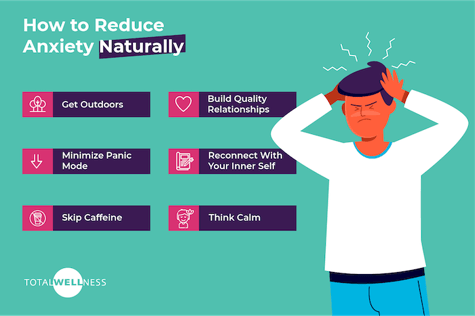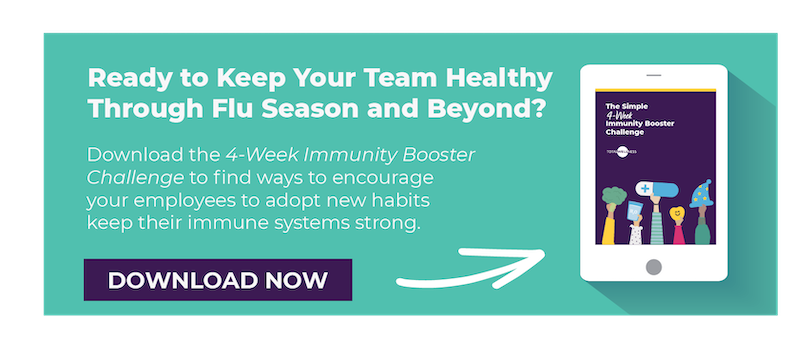 There is no denying anxiety levels are at an all-time high for many people.
There is no denying anxiety levels are at an all-time high for many people.
This month alone, people Googled the keyword “natural anxiety supplements” 8,100 times. In March and April, at the height of the pandemic lockdowns, related terms for anxiety relief hit over 12,000 monthly searches.
Individuals everywhere are looking at how to reduce anxiety naturally. It’s a safe bet that some of those searches came from yourself or employees, too.
Luckily, anxiety management techniques are available, as are ways to learn how to reduce anxiety naturally. By sharing this post with your team, you’ll give them tools to learn how to reduce anxiety on their own terms.
Here’s a look at how to reduce anxiety naturally. No meds required.
How to Reduce Anxiety Naturally
While COVID-19 and related events — like unemployment and business shutdowns — haven’t helped, anxiety isn’t a new phenomenon.
In fact, in the U.S. alone, 40 million people have an anxiety disorder, according to the Anxiety and Depression Association of America. As the most common mental illness, treatments have become readily available for individuals to try — yet only 36.9% get help.
Anxiety is a normal part of life. Our brains are hardwired to think about survival, which meant always being on alert for danger back in prehistoric times. Known as “fight or flight”, that survival mode was code for situations that required some anxiety to get to a safer place.
Yet sometimes it’s hard to turn that hardwired anxious mindset off. When anxiety becomes uncontrollable or involves extreme fear or worries, that’s when it can impact daily life.
Luckily, there are ways to reduce anxious feelings and anxiety attacks.
Best of all, it can be done immediately and without the use of medication. It’s important to note that natural remedies are often safe to use with standard medical therapies, but it’s always best to consult a doctor first.
Here are ways you can start reducing your anxiety naturally right now:
1. Get Outdoors
One of the best self-improvement opportunities that can reduce anxiety fast is spending time outdoors. There’s something about fresh air, sunshine, and the overall feel of natural spaces that evokes a sense of calm. Plus, a vitamin D boost (naturally from the sun) may help regulate mood better.
What to Try:
- Take a break every hour - If you can, get outside every hour for a few minutes. Whether it’s to walk the dog, check the mail, or walk around the block, it can elevate your mood.
- Listen to nature sounds - Can’t get outdoors due to inclement weather or another reason? Nature sounds have a similar anxiety-reducing impact, according to a 2017 study published inScientific Report.
When you are feeling overwhelmed (and maybe too cooped up from remote work), head to the great outdoors for some anxiety relief. Anywhere from 20 to 30 minutes of outdoor time can be enough to improve your mental outlook.
2. Minimize Panic Mode
When you’re in a constant state of panic, it’s hard for your body to differentiate between real panic and illusionary panic. Constant anxiety means you always feel like you’re in “fight or flight” mode, which releases stress hormones continuously and harms the body.
To minimize this constant flow of stress through your body, think of ways you can reduce your constant worrying, panic, or thoughts of negativity. That may mean skipping the news when you’re feeling anxious already or maybe even taking a break from social media for a bit. You get to decide.
What to Try:
- Tell yourself to stop - If you find thoughts of negativity are spiraling out of control, you can hit the brakes on the runaway thought train. Either silently or aloud, tell yourself to “stop!” It halts the thinking process and causes you to actively choose to continue on with a positive or negative thought.
- Breathe, deeply - Learning anxiety-reducing breathing exercises can also help you to minimize the need to feel and take on panic ASAP. It helps you to recenter your thoughts and consider if what you’re feeling requires rapid action.
- Nix your news habit - Yes, it’s good to keep up on current events, but if you find it makes you feel antsy, overwhelmed, or anxious, it may be time to cut back. Avoid watching the news all day long, but especially before bed.
- Avoid negative people - When possible, reduce your interactions with negative people. If you spend too much time with them, they may drain your energy and impact your attitude. Additionally, they may increase your anxiety by constantly sharing negative life experiences.
- Don’t go down the scroll hole - With every minute you spend on social media, you could be increasing your anxiety. Studies have found strong links to heavy social media use and anxiety and depression. Skip social media before bed and upon waking to minimize the need to compare or despair over the content you see.
Sometimes it’s simple to avoid panic or anxiety by minimizing contact with situations or people who stir that emotion up in you. Other times, it’s up to you to make conscious choices to avoid anxiety, like nixing your need to scroll on social media before bed.
3. Skip Caffeine
You may be asking, “Do I really need to skip caffeine if I have anxiety?” Much to java lovers’ dismay, the answer may be yes. While coffee benefits certainly exist, caffeine may cause issues for anxiety sufferers because of its stimulating effects. The “jitters” you get from caffeine are similar to the “fight or flight” response and can potentially trigger an anxiety attack.
What to Try:
- Reduce your intake - Consider reducing the amount of caffeine you consume daily. If you usually drink three cups of java in the morning, aim to drink 2 instead for a few weeks and see how it goes.
- Skip your afternoon pick-me-up - If you need to get through the afternoon and rely on a cup of Joe, it may be impacting your sleep. Insomnia can worsen anxiety. Try to cut off your consumption at least five hours before bed to allow the caffeine to leave your body so you can sleep soundly.
- Try a different beverage - If you still need a little lift in the mornings, try green tea or kombucha, both of which have traces of caffeine but not as much as coffee.
It’s important to note that stopping caffeine abruptly can potentially cause caffeine withdrawal, which may include headaches or worsen depression symptoms. Gradually decrease your caffeine consumption to reduce the negative effects that may occur.
4. Build Quality Relationships
If you’re constantly alone, it’s easy to get into your own head. With the pandemic forcing many into mandatory lockdowns, isolation and loneliness are on the rise. This, in turn, can trigger or worsen feelings of anxiety. Connect with colleagues, close friends, and family members when you can.
What to Try:
- Connect every day - Try connecting daily with a loved one, whether it’s by text, phone, or video. Meet face-to-face, if possible, while social distancing!
- Find those who get you - Join a self-help or support group for anxiety. You’ll be able to better relate to these individuals and may be able to connect and form life-long friendships.
- Share - Don’t bottle your concerns up. It can cause psychological and physical damage to your health. Share your worries with others you trust to get through anxious times.
We are social beings. No matter how bad your anxiety gets, it’s important to have someone you trust to talk to alleviate the build-up of too many anxious thoughts. Consider investing in friendships where it feels easy to bounce ideas off one another and reduce anxiety through simple connections.
5. Reconnect With Your Inner Self
When life gets busy, it’s easy to feel disconnected from others, but especially yourself. When you squash your emotions, bottle them up, and generally ignore how you’re feeling, it puts you in a mindset — consciously or not — that you don’t matter. When you take time to reconnect with yourself and get in touch with your emotions, it gives you an opportunity to learn more about what triggers your anxiety as much as what brings you happiness.
What to Try:
- Yoga - Mindful exercise, like yoga, is good for reducing anxiety. Not only does it count as exercise for the body, but it’s also a good exercise for the mind. Many yoga moves require deep concentration on holding poses correctly while also focusing on the breath, which requires mindfulness in the moment — a great anxiety reducer.
- Journaling - Writing can be a calming and therapeutic experience for many. Not only is it an outlet to be creative, but it allows you to put your anxious thoughts somewhere other than your brain.
You spend more time with yourself than anyone else. It’s time to learn how to handle your emotions in healthy ways to tackle those emotions day in and day out. Journaling and yoga are just two ways to do it, but there are plenty of other activities worth trying.
6. Think Calm
Believe it or not, you can stop making worrying a go-to habit. Instead, let go of worse-case scenario thinking. Breathing deeply, working on thinking patterns, meditating, and accepting a current situation are all ways to evoke calmer thinking.
What to Try:
- Breathe - This is a common helpful technique in handling anxiety on a daily basis. If you notice your breathing is shallow, slow it down by taking deep breaths in from your belly. Deep breathing lowers your heart rate and stabilizes your blood pressure. It can restore calm even in the midst of what feels like chaos.
- Work on thinking patterns - Anxiety begets anxiety. If you think anxious, fearful thoughts, it can cause a cascading effect. If you’re nervous about a big work presentation, instead of telling yourself you’re “going to mess up” try reframing your thoughts. Remind yourself that you’ve prepared and show yourself some self-compassion by telling yourself, “Things may not go perfectly, but that’s okay. I will do my best with how I’ve prepared.”
- Meditate - In the midst of an anxiety attack, meditating may not feel like a super helpful activity to try. But, consistent meditation can enhance your self- awareness and further help you understand what triggers may set you off and how to calmly respond to them instead of reacting out of fear.
Need More Help With Anxiety? Here Are Some Resources
To help yourself or your employees, it’s important to take steps to understand anxiety, its triggers, and what resources are available. Help is available as are resources to teach individuals how to reduce anxiety naturally, through therapy, and even medicine, if needed.
Below are a few professional anxiety organizations with resources and educational materials to further understand anxiety and its impacts.
Get help through these organizations:
- Social Anxiety Association
- National Alliance on Mental Health
- Anxiety and Depression Association of America
Other shareable resources from our blog include:
- 13 Tips on How to Stay Positive During Anxious Times
- Anxiety vs. Stress: Why Employers Need to Know the Difference
- 23 Expert Anxiety Management Techniques to Help Your Employees
- Mental Health Month Guide: Let Your Employees Know They Aren’t Alone
How do you calm your anxiety when it spikes? What tools, resources, or techniques do you find helpful during anxious times? Share your thoughts in the comments below!



